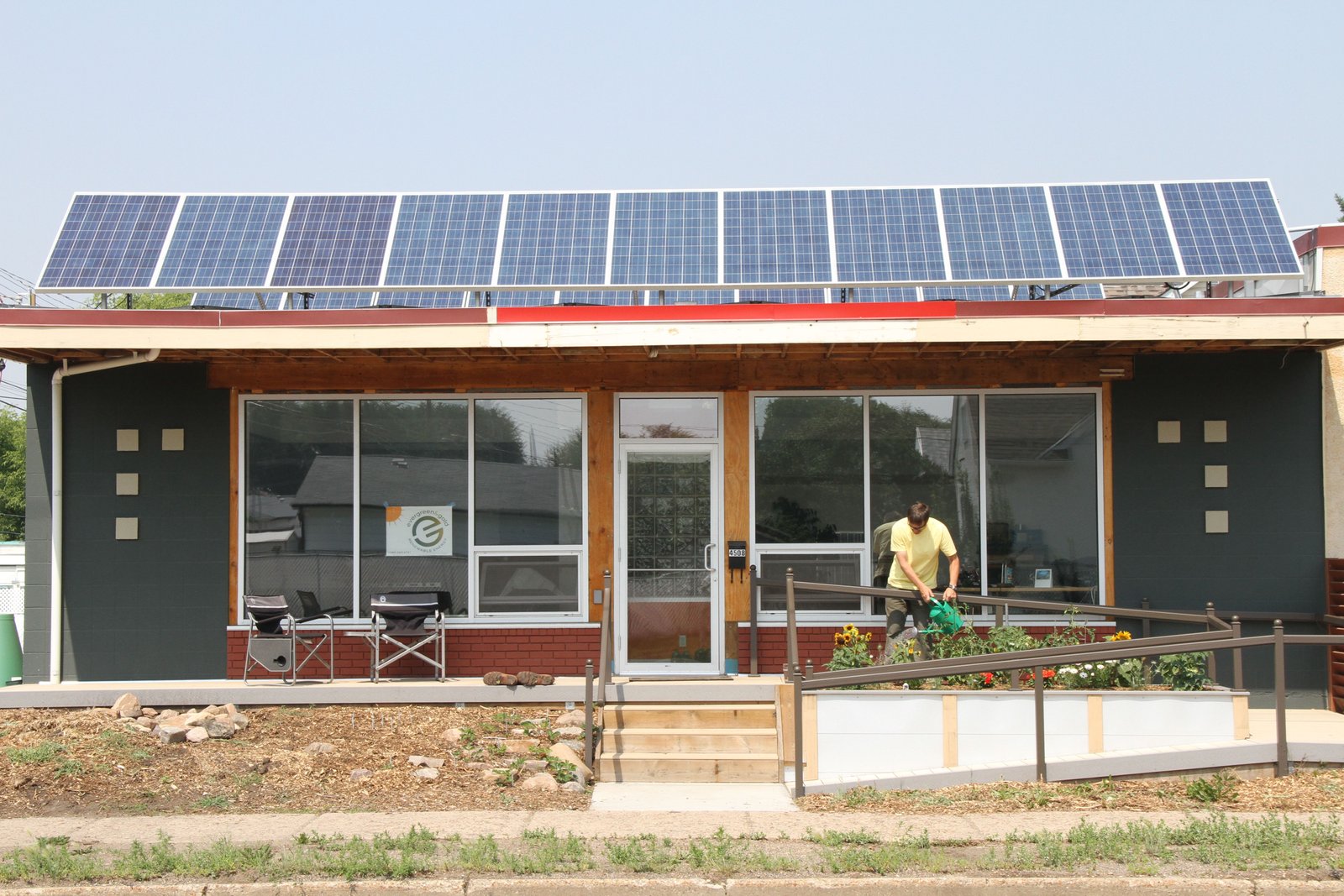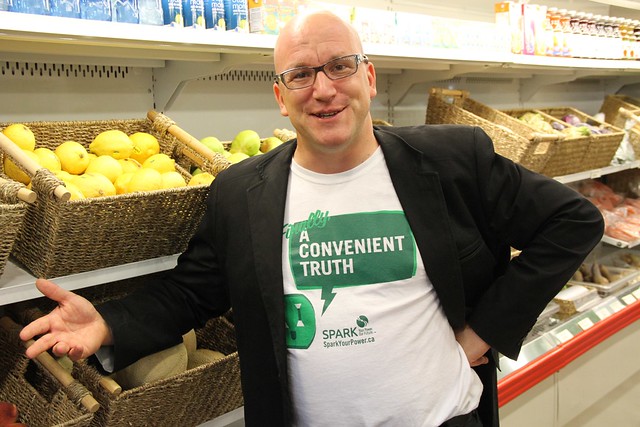By David Dodge and Duncan Kinney
To Warren Sarauer putting a solar electric system on his roof was a no-brainer but when some innovative electricity retailers in Alberta decided to offer almost double the going rate for his exported solar energy he was ecstatic.
Sarauer is a big solar energy supporter – through his company Evergreen and Gold Renewable Energy he puts renewable energy systems into people’s homes. But last year he tackled a project that would set an example for his clients, he built a net-zero office.
Sarauer bought an old, fading grocery store in the east Edmonton neighborhood of Newton and completely renovated it top-to-bottom to build a super efficient, solar-powered office for his company.

Warren Sarauer waters the plants at his net-zero office in the east Edmonton community of Newton.
Today he powers his net-zero office space with a relatively small 8.5 kW solar system. According to the micro-generation regulation in Alberta Sarauer can sell any excess solar electricity to the grid at the same price as he buys electricity, a price that hovers around $0.08 per kilowatt-hour.
But this year a bevy of Alberta’s small boutique energy retailers got together to do something really different. In Alberta’s deregulated electricity market they launched Light Up Alberta, a program that offers a $0.15 a kilowatt-hour rebate for solar electricity exported to the grid.
So is it fair that solar should get a premium price? With an electric grid in Alberta that’s dominated by coal Sarauer thinks so: “[Coal is] terrible for the environment. It pollutes our water, it pollutes our air and it contributes to our healthcare costs, which we all pay for. As a society we pay a cost, so yes I think it’s more than fair that I get paid a premium for offsetting some of that.”
Not only that but for a small business owner who is mindful of keeping costs down, the terms are quite attractive.
“I buy power at a little over $0.08 cents a kilowatt hour and I get to sell it back at $0.15 cents a kilowatt-hour. It’s a no brainer, why wouldn’t I do it?”
Spark Your Power
Light Up Alberta was spearheaded by a small, innovative retail electricity cooperative called Spark.
According to Paul Cabaj, one of the founders, Spark is “Alberta’s first renewable energy coop” with a focus on supporting green energy development and providing some of the cheapest baseline power in Alberta. Spark has also promised to use 70 per cent of its profits to support renewable energy projects.
In order to build a renewable energy ecosystem in Alberta Spark joined forces with the other boutique retailers to offer the rebate. “Our purpose is to support green and we actually lose money on this,” says Cabaj.
But does it catch the attention of people with small solar systems? Solar is in its early stages of development in Alberta, but when news of Light Up Alberta customers like Sarauer getting a $152 rebate starts to get around people will take notice, says Cabaj.

Paul Cabaj is a founder of Spark, a retail electricity cooperative, and also spearheaded the Light Up Alberta program.
One of the goals of Light Up Alberta is to catch the attention of people considering solar and they’ve certainly chosen an effective tactic. This program can shorten the time it takes for a solar system to pay for itself by seven or eight years. It’s not the sort of start-up support that will attract solar manufacturing plants to Alberta, but it does help solar energy keeners take those crucial first steps to installing and producing solar electricity.
Support for solar and other renewable energy technologies in Alberta’s deregulated electricity market has been spotty at best. Cabaj was involved with groups trying to get a feed-in-tariff going in Alberta just like the ones you see in Ontario, Nova Scotia or Germany. When those efforts went nowhere Cabaj decided to try a voluntary, market-based approach. .
“We think that if we can get to the 10,000 customer range that’s a pretty significant lobby group that can make a difference.”
Even this small financial incentive could be enough to make rooftop solar a more attractive investment in Alberta. It’s also a solid advertising tactic smaller retailers hoping to get noticed.
Cabaj says there are 450-600 micro-producers in Alberta and that Spark hopes to capture as many of those folks as possible. He thinks the solar rebate can help: “Suddenly the economics change, going from a 20-year payback to a 12-year payback. Then I think we’ll see a lot more buy-in to this process,” says Cabaj.
Ironically, a project like Light Up Alberta is possible because of Alberta’s deregulated electricity market. The architects of the now 11-year-old deregulated system envisioned competition and dozens of electricity retailers offering differentiated products. But that hasn’t happened and the incumbents, the retail operations of the city-owned utilities Enmax and Epcor, dominate with a little competition provided by door-to-door contract sellers like Direct Energy and Just Energy.
This voluntary feed-in tariff program is still just a small step, but being a small, nimble operation has its advantages. “We can actually be that centre of innovation that pulls the rest forward,” says Cabaj.
It was a small municipally owned utility in Germany that started the renewable energy revolution in Germany with the world’s first effective feed-in tariff. Can Light Up Alberta be the fuse that ignites Alberta’s massive renewable energy potential?


